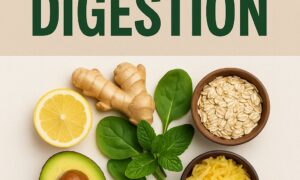Bloating is an uncomfortable and often embarrassing issue that many people experience from time to time. That feeling of fullness, tightness, or swelling in the abdomen can interfere with your daily life, making you feel sluggish or self-conscious. While occasional bloating is normal, persistent bloating might signal an underlying problem or simply reflect lifestyle habits that need attention. Fortunately, there are natural remedies that can help reduce bloating and support healthy digestion without relying on medications.
Here are five effective and easy-to-follow natural remedies to beat bloating for good.
1. Stay Hydrated with Water and Herbal Teas
Drinking enough water is crucial for digestion and helps prevent constipation, a common cause of bloating. Water flushes out excess sodium, which can cause water retention and swelling. Additionally, herbal teas like peppermint, ginger, and chamomile have soothing properties that relax the digestive tract muscles and reduce gas buildup.
- Peppermint Tea: Peppermint relaxes the muscles in your digestive system, allowing trapped gas to pass more easily.
- Ginger Tea: Ginger is a natural anti-inflammatory and can speed up stomach emptying, helping to relieve bloating.
- Chamomile Tea: Chamomile soothes the stomach lining and calms digestive discomfort.
Aim to drink at least 8 glasses of water daily and enjoy a cup of herbal tea after meals for best results.
2. Eat Mindfully and Avoid Gas-Producing Foods
What you eat and how you eat can significantly impact bloating. Eating too quickly can cause you to swallow air, increasing gas and discomfort. Slowing down, chewing food thoroughly, and eating smaller meals can aid digestion.
Certain foods are known to produce more gas or cause bloating in some people. These include beans, lentils, carbonated drinks, cruciferous vegetables (like broccoli and cauliflower), onions, and artificial sweeteners.
To beat bloating naturally:
- Identify and limit foods that trigger your symptoms.
- Opt for easier-to-digest alternatives like zucchini, spinach, and cucumbers.
- Consider keeping a food diary to track which foods cause bloating.
3. Incorporate Probiotics for a Balanced Gut
A healthy gut microbiome is essential for digestion and preventing bloating. Probiotics—beneficial bacteria found in fermented foods or supplements—can help balance gut flora, improve digestion, and reduce gas production.
Fermented foods rich in probiotics include:
- Yogurt with live cultures
- Kefir
- Sauerkraut
- Kimchi
- Miso
Adding these to your diet regularly can promote a healthier digestive system and naturally combat bloating.
4. Try Gentle Physical Activity
Exercise stimulates the muscles in your digestive tract, helping to move gas and waste through your system more efficiently. Even light activities such as walking or yoga can alleviate bloating.
Certain yoga poses are particularly effective for digestion and reducing abdominal discomfort:
- Wind-Relieving Pose (Pawanmuktasana): Helps release trapped gas and reduce bloating.
- Seated Twist (Ardha Matsyendrasana): Stimulates digestion and massages abdominal organs.
- Child’s Pose (Balasana): Calms the digestive system and relieves stress, which can worsen bloating.
Try to incorporate at least 20–30 minutes of gentle exercise into your daily routine for better digestive health.
5. Use Natural Digestive Aids
Several natural ingredients have been traditionally used to aid digestion and reduce bloating:
- Fennel Seeds: Known for their carminative properties, fennel seeds help relax digestive muscles and expel gas. Chew on a teaspoon after meals or brew fennel tea.
- Apple Cider Vinegar: Diluted apple cider vinegar before meals can improve stomach acid levels and promote digestion. Mix 1–2 teaspoons in a glass of water and drink before eating.
- Activated Charcoal: Sometimes used to trap gas in the digestive system, though it should be used sparingly and under guidance.
- Chamomile and Ginger: Both reduce inflammation and soothe the digestive tract.
Always consult with a healthcare professional before adding supplements to your routine.
Additional Tips to Prevent Bloating
- Avoid chewing gum, which causes you to swallow extra air.
- Limit intake of salty foods to prevent water retention.
- Manage stress through relaxation techniques, as stress can impact digestion.
- Avoid tight clothing that restricts abdominal movement.
When to See a Doctor
While occasional bloating is common and usually harmless, persistent or severe bloating accompanied by other symptoms like weight loss, severe pain, or changes in bowel habits should be evaluated by a healthcare provider. These signs may indicate a more serious condition such as food intolerance, irritable bowel syndrome, or other digestive disorders.
Conclusion
Bloating can be an uncomfortable barrier to feeling your best, but with these natural remedies, you can often reduce symptoms and support healthy digestion. Staying hydrated, eating mindfully, incorporating probiotics, moving your body regularly, and using natural digestive aids all work together to keep your digestive system running smoothly.
























